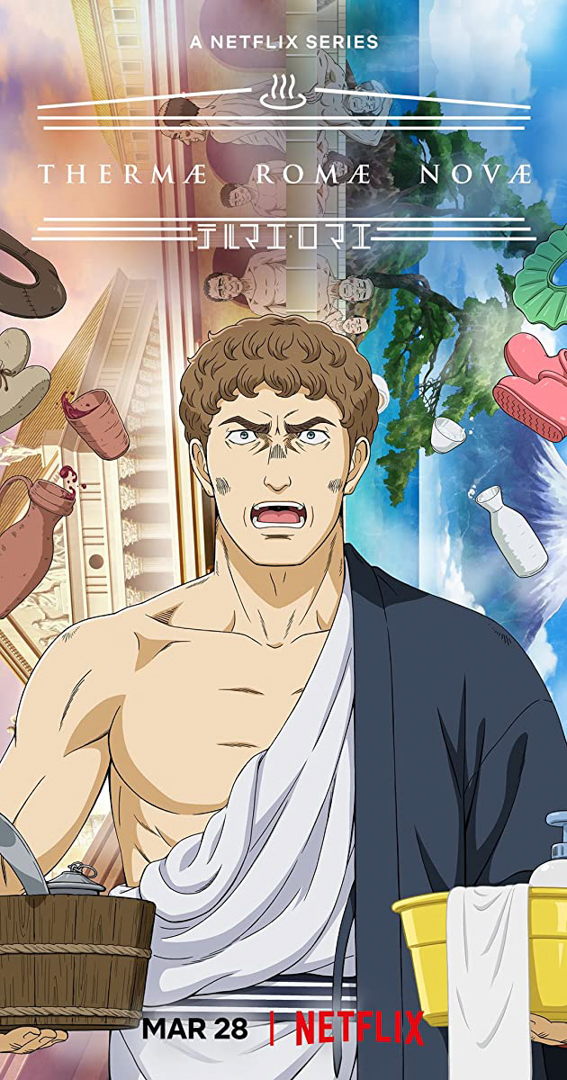Thermae Romae Novae is a Netflix-produced anime series following Roman bathhouse architect, Lucius Modestus. Coming from a family of architects, all of whom share a passion for bathing, Lucius follows in his family’s footsteps with the hopes of becoming Rome’s greatest architect. In every episode, Lucius finds himself travelling through time after slipping in the bath and waking up in different bathhouses in different eras of Japan. Each time, he observes with keen wonder the bathing customs of the Japanese people, despite being confused and mystified by technological advancements not yet known in ancient Rome. After learning a new solution to a bathhouse construction-related problem back home, Lucius wakes up back in Rome as if he was waking from a dream (occasionally with objects from Japan) and employs what he learned in the construction of a new, revolutionary bathhouse. After each episode, there is a short documentary segment that follows the author around Japan that sheds a light on modern Japanese bathing culture.
The anime is based off of an award-winning manga by author Mari Yamazaki. Yamazaki expresses at the end of one of the episodes that she lives full-time in Italy, but was raised as a child in Japan before moving to Europe when she was 17. The author likes to incorporate aspects of her Japanese upbringing into her home arrangement in Italy. Yamazaki began drawing pictures of bathers in Japan after feeling nostalgic for public bathhouses. Despite their commonality in ancient ruins, there were none available where she was at the time. The manga became a smash hit in Japan, and in 2012 was adapted into a smaller flash anime and an award-winning live-action comedy film with a follow-up sequel. This latest anime adaptation was released onto Netflix on March 28, 2022.
The show stays consistently light-hearted and goofy throughout its ten episodes. It’s the perfect way to cap off a busy evening with some relatively mindless entertainment. The voice actor, Kenjirô Tsuda, as the main character Lucius, is top-notch and absolutely chock-full of exaggerated expressions. Much of the show’s comedy comes from Lucius’ inflated stoicism and curiosity when experiencing completely foreign things, such as shower caps and pool floaties, and mistaking them for things like royal crowns and mock horses for training children for battle. While a few plot holes do exist in the narrative, it doesn’t pull you out of the story so much as it adds to the comedy. For instance, it’s never really explained how or why Lucius has the ability to time-travel via bath. Nobody else can time travel, and despite many of the incidents appearing to be almost concussion-like in nature, he is able to bring objects from Japan back with him. When left decontextualized, something like this just adds to the absurd comedic feel of the story.
In many ways, the show feels like a spiritual cousin to another Netflix anime, The Way of The Househusband, albeit with a much less manga-like animation style. The hyper-expressive facial expressions and slice-of-life comedy packed with sass highlights the importance of enjoying the little things in life, like being clean and taking a bath. In the same way that The Way Of The Househusband left me inspired to deep clean my apartment, Thermae Romae Novae will get you super-jazzed on taking a hot bath, going to the pool, hitting up the waterslides, and most importantly, enjoying quality time with friends and family. As hotter weather approaches, a show like this feels very appropriate.
Kellyn Kavanagh (they/he) is a local writer, photographer, and musician. They first started writing what they now know to be flash fiction stories in the third grade when they learned how to make little books with a couple sheets of printer paper and a stapler. Their work typically focuses on non-ficiton journalism, short horror fiction, and very depressing poetry.



